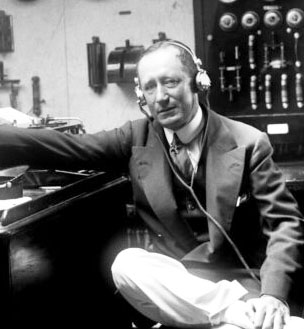Imagine our world without ‘wireless fidelity’, Wi-Fi for short. The cell phone, radio, radar, and broadcast television unite the globe using Nature – the very air we breathe – as the medium.
Just as Cristoforo Colombo united mankind with that first courageous voyage across the dark Atlantic in 1492, another Italian connected humanity with an airborne signal that spanned that same ocean on December 12, 1901.

Guglielmo Marconi was the offspring of an Italian father and Scots Irish mother, of the famous Jameson Irish Whiskey family. Although raised and educated in Italy, his bi-cultural pedigree gave him access to both the Latin and Anglo-American worlds. That access made him a vessel for scientific knowledge and a vehicle for invention.
No one before Marconi sent a Morse Code signal across an ocean without wires. Cables were first laid on the Atlantic Ocean floor in 1866 and by the late 1800s European inventors created sound waves for short distance signaling. In fact, young Marconi was experimenting with sound waves at his father’s villa in 1895. It was there that he transmitted the letter “S” to a receiver held by his assistant Mignani. The kicker was that Mignani was behind a hill, not in view. To let Marconi know he had received the signal, Mignani fired off a pistol. “That was the moment when wireless was born,” wrote Marconi years later of hearing that shot.
Marconi’s first attempt to transmit across the vast ocean in 1901 was dismissed beforehand by experts who believed that sound waves could never follow the curvature of the Earth. Actually, it was true, but Marconi’s waves bounced off the dense atmosphere and remained earthbound. Like Columbus, Marconi didn’t follow the experts and furthered human progress.
There were quite a few contemporaries of Marconi who claimed the invention of wireless telegraphy. First among them was Serbian Nikola Tesla, a genius who pioneered Alternating Current (AC) transmission. Tesla filed a patent for wireless communication in 1893 but it was a complex system that was never realized. Then there was the Russian Alexander Popov who eventually conceded that Marconi was “father of wireless”. Indian physicist Jagadish Bose discovered microwaves and used them for stunts like ringing a bell, but he was never interested in communication or commercial application.
Eighteen months before the historic December 12th transmission, Marconi had patented his now-famous Master Patent 7777 which divided sound frequencies for simultaneous transmissions – the basis for preventing ships, airplanes, and radio stations from interfering with each other. One of those ships was the Titanic.
Before the Titanic was even built, Marconi had established the Marconi’s Wireless Telegraph Company in Britain to provide steam ships with wireless operators and equipment. In 1909, over 1,700 people were rescued at sea from the SS Republic after colliding with an Italian ship off the U.S. East Coast. The Marconi operator on board the Republic was able to send out 200 messages for help and guide rescuers through the foggy conditions.
It is well-known how the Marconi operators on the foundering Titanic worked tirelessly to reach nearby ships, the closest one having shut down its wireless station for the night. However, another ship the Carpathia received the signals and managed to rescue 703 survivors. When the Carpathia arrived in New York with the survivors, Marconi happened to be there. He was the most popular man in the world for effecting the technology that saved so many. “I can’t go about New York without being mobbed,” he wrote his wife. The New York Times editorialized that no one on Titanic would have survived without Marconi’s invention: “…he stands alone as the originator of ethereal communication.”
His popularity in the U.S. and Great Britain was such that even as Marconi became a fervent Fascist in the 1920s and a defender of the Abyssinian War in the mid-1930s, he was treated respectfully in both countries. However, he sensed that his patriotism required a return to his homeland for good. It was there that he died in 1937, age 63. His funeral in Rome was a state event with half a million Italians paying homage to him.
Today, Marconi lives among us in corporations like General Electric and RCA – which purchased wireless companies founded by Marconi here in America. But most of all, Marconi is in every wireless application we find indispensable to our lives. -JLM

I only wish our youth and in particular our more vocal, visible youth on social media would understand the contributions of Marconi. If only they could take the time to learn more about culture, history and accomplishments beyond food.
Sad to say, Many Italian Americans are in name only. Connections to the old sod are nostalgic only, Food and the “mob” are what spur them to the connection and history and education are the last of their worries.
The more our generations are diluted, the more it will become a distant past with a new blend of ethnicity forming.
This is sad but we are glad we were part of a generation which could enjoy the old and the history that went along with it.